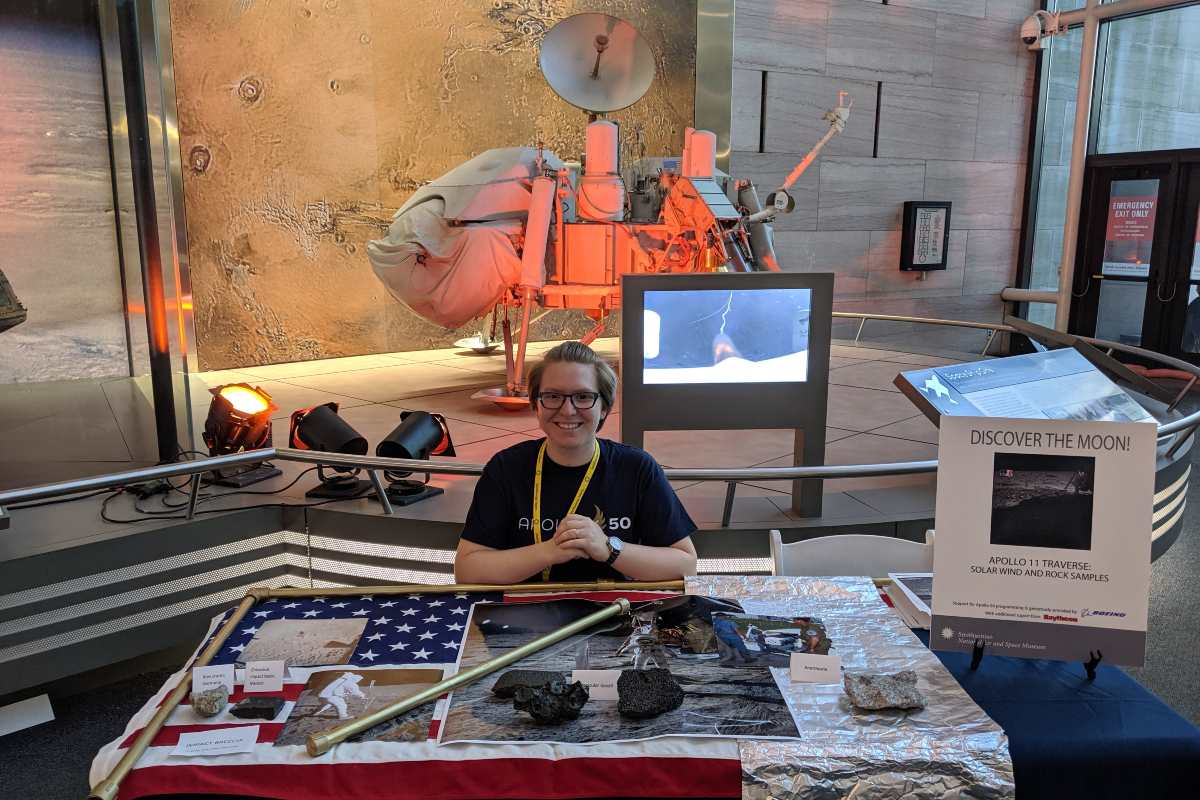
Miranda Holt, member of the graduating class of Spring 2020, pictured during her internship at the Smithsonian National Air and Space Museum. Photo supplied.
While the COVID-19 pandemic has required that convocation move online this year on June 12, the University of Alberta is still proudly celebrating the hard work and achievement of our graduating class. Today, meet Miranda Holt, graduating with a BSc in geology from the Department of Earth and Atmospheric Sciences, as she reflects on her studies at UAlberta, discovering a love for the science behind museum collections, and an internship at the Smithsonian National Air and Space Museum.
What led you to pick UAlberta for your studies?
My mom and older sister both attended University of Alberta so it felt like a natural option for me. That in addition to my interest in the earth science programs offered at UAlberta solidified the choice for me.
Tell us about your experience in the Faculty of Science.
My experience here was one of discovery. While I knew from the beginning that I was interested in earth sciences, I had no idea where that could take me. It wasn't until two summers ago when I had the chance to work as a collections assistant within the University of Alberta's Department of Earth and Atmospheric Science collections that I finally realized what path I wanted to pursue. This was where my interest in planetary science was piqued after working with our meteorite collection. I really enjoyed every aspect of that job, and I now know my ideal career would be in museum collections work. Since then I've done volunteer work with the meteorite collection and museums, done research on the Tagish Lake meteorite and the Moon, and even had the opportunity to intern at the Smithsonian National Air and Space Museum last summer.
What is one of your favourite memories from your time at UAlberta?
It's difficult to choose just one memory, since I have so many good ones from my time spent working in museum collections here as well as at my Smithsonian internship, but if I were to pick one I got to participate in only because I was a student here, it would be the time that my lab group spent last fall searching for the meteorite that fell near Camrose and caused the fireball that was seen by many in late August. While our search wasn't particularly fruitful—we have yet to find any specimens, after all—I'll never forget the excitement we experienced during what I could only describe as "the thrill of the chase" phase, and spending the last few really nice summer days out in the field instead of in the classroom wasn't too bad either.
What advice do you have for current and future students at the Faculty of Science?
Talk to people! If you're struggling in a class, or are interested in a professor's research area, reach out to them! They likely want to hear from you just as much as you do from them. Your classmates probably want a study buddy and lab partner too, and the best thing you can take out of your experience here is the friendships you make.
Also, try not to take everything too seriously! Work hard, but make sure you rest when you need it and enjoy yourself. Chances are you might not remember how to do integrals, those physics equations you memorized, or 82 mineral formulas in a decade or two, so make sure you make lots of other good memories while you're here.
How have you spent your time during COVID-19 distancing?
After finishing up writing my undergraduate thesis analyzing of the mineralogy, texture, and Fe-Ni sulfide minerals within the Tagish Lake meteorite, I've spent my time reading, baking cookies, helping out on my grandpa's farm, and watching Star Trek with my mom, and plan on taking some time to draw and play my violin, both of which I've had less time for than I'd like recently.
How do you plan on celebrating convocation?
I haven't given too much thought to how exactly I want to celebrate, but each time I've graduated in the past I've taken a photo with the spruce tree in my backyard we planted when I was in grade one, and you better believe I'll be continuing that tradition.
What's next after graduation?
I've been lucky enough to be accepted to begin a master's degree studying planetary geology with Professor Chris Herd here in the University of Alberta’s Department of Earth and Atmospheric Sciences beginning this fall, so I'll be back here almost as soon as we're all able!